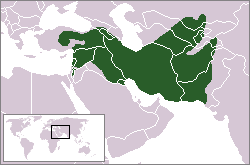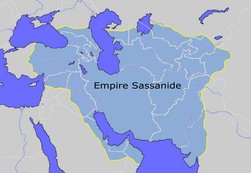The introductions of the country, dependency and region entries are in the native languages and in English. The other introductions are in English.
| |
|

|
Levant
|
[[File:|border|130px]]
|
|
|
|
|
|
بلاد الشام
|
|
|
|
| English
|
Levant -
The Levant (/ləˈvænt/) is an approximate historical geographical term referring to a large area in the Eastern Mediterranean region of Western Asia. In its narrowest sense, it is equivalent to the historical region of Syria, which included present-day Syria, Lebanon, Jordan, Israel, Palestine and most of Turkey south-east of the middle Euphrates.
|
|
| Short name
|
Levant
|
| Official name
|
|
| Status
|
|
| Capital
|
|
| Population
|
~50 million inhabitants
|
| Area
|
km²
|
| Major languages
|
Arabic
|
| Major religions
|
Islam, Christianity, Judaism
|
| More information
|
Levant, Geography of Levant, History of Levant and Politics of Levant
|
| More images
|
Levant - Levant (Category).
|
|
General maps
History maps
This section holds a short summary of the history of the area of present-day Levant, illustrated with maps, including historical maps of former countries and empires that included present-day Levant.

|
Greater Syria according to Syrian Social Nationalist Party
|

|
Ancient Near East 1450 B.C.
|

|
Ancient Egypt, Syria and Mesopotamia c. 1450 BC
|

|
Near East in circa 1400 BCE
|

|
Greater Syria
|

|
Byzantine Empire animated timeline
|

|
Syria and Cilicia, 600 BC
|

|
Median Empire, 6th century BC
|

|
Achaemenid Persian Empire in the time of the Cyrus the Great
|

|
Achaemenid Persian Empire in the time of the Cyrus the Great
|

|
Achaemenid Persian Empire, 588-536 BC
|

|
Achaemenid Persian Empire, 588-536 BC
|

|
Achaemenid Persian Empire, 579-560 BC
|

|
Achaemenid Persian Empire, around 500 BC
|

|
Achaemenid Persian Empire, around 500 BC
|

|
Achaemenid Persian Empire, around 500 BC
|

|
Achaemenid Persian Empire, around 490 BC
|

|
Achaemenid Persian Empire in the time of the Darius the Great
|

|
Achaemenid Persian Empire, around 480 BC
|

|
Achaemenid Persian Empire, around 480 BC
|

|
Achaemenid Persian Empire
|

|
Achaemenid Persian Empire
|

|
Macedonian Empire, 336-323
|

|
Macedonian Empire, 334-323 BC
|

|
Macedonian Empire, 331-301 BC
|

|
Macedonian Empire, 323 BC
|

|
Macedonian Empire, 323 BC
|

|
Macedonian Empire
|

|
Macedonian Empire
|

|
Macedonian Empire
|

|
Macedonian Empire
|

|
Seleucid Empire, 323 BC
|

|
Seleucid Empire, 301 BC
|

|
Seleucid Empire, 200 BC
|

|
Seleucid Empire, 194 BC
|

|
Seleucid Empire
|

|
Seleucid Empire
|

|
Seleucid Empire
|

|
Parthian Empire, 1 AD
|

|
Roman Empire circa 125
|

|
Empire of Palmyra circa 260
|

|
Roman Empire divisions circa 295-395
|

|
Sassanid Persian Empire and Eastern Roman Empire, around 400 AD
|

|
Roman-Persian Frontier, 5th century
|

|
Sassanid Persian Empire and Eastern Roman Empire, around 500 AD
|

|
Roman-Persian Frontier, 565
|

|
Sassanid Persian Empire and Eastern Roman Empire, 6th century
|

|
Sassanid Persian Empire, 6th century
|

|
Sassanid Persian Empire, 600 AD
|

|
Sassanid Persian Empire and Eastern Roman Empire, 600 AD
|

|
Sassanid Persian Empire, 620 AD
|

|
Sassanid Persian Empire, 226-651
|

|
Sassanid Persian Empire
|

|
Persian Empires, 610 BC-651 AD
|

|
Roman Empire between 218 BC and 117 AD
|

|
Dioecesis circa 400
|

|
Roman-Persian Frontier in Late Antiquity, 4th-7th centuries
|
Since Muslim Conquest

|
Administrative divisions of Syria in the 9th century (Arabic)
|

|
Crusader states, 1135
|

|
Crusader states, 1165
|

|
Crusader states, 1190
|

|
Ghurid Iranian Empire, 1149-1212
|

|
Ayyubid Empire, 1171-1246
|

|
Ayyubid Empire, 1171-1246
|

|
Ayyubid Empire, 1171-1246
|

|
Ayyubid Empire, 1188
|

|
Ayyubid Empire, 1188
|

|
Ayyubid Empire, 1189
|

|
Ayyubid Empire, 1190
|

|
Ayyubid Empire, 12th century
|

|
Northern Levant, 13th-14th centuries
|

|
Anatolia and surrounding regions in AD 1200
|

|
Ayyubid Empire, 1250-1260
|

|
Ayyubid Empire, 1257
|

|
Ayyubid Empire
|

|
Timurid Empire, 1365-1405
|

|
Timurid Empire, 1405
|

|
Timurid Empire, 1405
|

|
Timurid Empire, 1405
|

|
Timurid Empire
|

|
Timurid Empire
|

|
Timurid Empire
|

|
Safavid Persian Empire in 1501-1722
|

|
Safavid Persian Empire in 1501-1722
|

|
Safavid Persian Empire in 1512
|

|
Safavid Persian Empire, 16th-18th century
|
Ottoman era

|
Ottoman Empire map from 1481 to 1683 (in Spanish)
|

|
Ottoman Empire 1481-1683
|

|
A French map of ancient Syria and surroundings in 1683
|

|
Ottoman Cedid Atlas map from 1803 showing Syria in yellow
|

|
Ottoman Syria Vilayets in 1842
|

|
Ottoman Empire in 1849
|

|
Henry Warren Map of Syria in 1851
|

|
Ottoman administrative divisions in western Syria circa 1889
|

|
Ottoman Syria Vilayets circa 1899
|

|
Ottoman Syria Vilayets circa 1900 (in Arabic)
|

|
Ottoman Vilayets in 1900 (in Spanish)
|

|
Ottoman Vilayets in 1900
|

|
Ottoman Syria Vilayets
|

|
Map showing Syria, Mesopotamia, Assyria, and Turkey in 1912
|

|
Administrative divisions of Ottoman Syria (early 20th century) in Arabic
|

|
Administrative divisions of Ottoman southern Syria in 1914
|

|
Ottoman Syria
|

|
Ethnographical Map of Turkey and Syria in 1910
|
Since WWI

|
Integral Syria 1915
|

|
Sykes-Picot agreement to divide Syria
|

|
Sykes-Picot agreement to divide Syria
|

|
Map of Syria in 1920
|

|
Treaty of Sèvres map
|

|
Syrian Arab Kingdom in 1920
|

|
Syrian Arab Kingdom in 1920
|

|
Asia Minor, Syria and Mesopotamia in 1920
|

|
French first attempt at dividing Syria in 1920
|

|
Map of Syria in 1920
|

|
Area in yellow shows Syrian Northern Sanjaks ceded by France to Turkey in the 1921 Ankara Agreement
|

|
Area in yellow shows Syrian Northern Sanjaks ceded by France to Turkey in the 1921 Ankara Agreement
|

|
Palestine, Syria and Hejaz in 1922, based on Treaty of Sevres
|

|
Treaty of Lausanne between Turkey and Syria/Iraq
|

|
Treaty of Lausanne border between Turkey and Syria/Iraq
|

|
Treaty of Lausanne border between Turkey and Syria/Iraq
|

|
Treaty of Lausanne border (in Arabic)
|

|
Division of Syria in 1922 by French mandate authorities (in Arabic)
|

|
Map of Greater Syria encompassing areas from Cyprus and Adana (Turkey) to Kuwait and Ahwaz (Arabistan), including the Levant and Mesopotamia
|

|
Map of Greater Syria encompassing areas from Cyprus and southeastern Turkey to Kuwait, including the Levant and Mesopotamia
|
Notes and references
General remarks:
- The WIKIMEDIA COMMONS Atlas of the World is an organized and commented collection of geographical, political and historical maps available at Wikimedia Commons. The main page is therefore the portal to maps and cartography on Wikimedia. That page contains links to entries by country, continent and by topic as well as general notes and references.
- Every entry has an introduction section in English. If other languages are native and/or official in an entity, introductions in other languages are added in separate sections. The text of the introduction(s) is based on the content of the Wikipedia encyclopedia. For sources of the introduction see therefore the Wikipedia entries linked to. The same goes for the texts in the history sections.
- Historical maps are included in the continent, country and dependency entries.
- The status of various entities is disputed. See the content for the entities concerned.
- The maps of former countries that are more or less continued by a present-day country or had a territory included in only one or two countries are included in the atlas of the present-day country. For example the Ottoman Empire can be found in the Atlas of Turkey.
|
Entries available in the atlas
- General pages
- World
- Continents and oceans
- Themes
- Historical eras
- States with wide recognition
- States with limited recognition
- Dependencies and other overseas territories
- Country subdivisions
- Belgium
- China (mainland)
- India
- Pakistan
- Spain
- United Kingdom
- United States
- Russia
- Other
- Disputed subnational territories
- Other regions
- Cities
- Former sovereign states
- Former dependencies and overseas territories
- Former disputed territories
|



























































































































